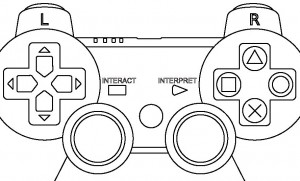In a recent WSJ column, book author Christopher John Farley wonders whether literature could be social in the same way social networking sites are. He writes “Video games used to be more like books – essentially solitary experiences which involved people separating themselves from groups”. http://blogs.wsj.com/speakeasy/2014/01/02/can-social-literature-compete-with-social-media/
The reasoning follows: if video games managed to become ‘social’, so can books. I disagree on this point, and I think that linear narratives are wonderful things that should give value to their own merits – not chase the characteristics of interactive media. And, likewise, so should video games.
I suppose that we might be witnessing a new trend in the relation between games and narratives. Until now, many game-authors suffered from “narrative envy” (e.g. the tendency to forget the strengths of ludic media in favor of linear narration). I wonder if we’re witnessing a reversal: the rise of “game envy” in traditional book authors.
I do not support this trend. What I propose, instead, is a widespread digital alphabetization and education where authors – regardless of their preferred medium: ludic, linear, transmedia or otherwise – engage in a dialogue with related fields but at the same time remain very conscious of the affordances and limitations of their own.

 Jonne Arjoranta defended his PhD thesis at the University of Jyväskylä (Finland) with Espen Aarseth as opponent/discussant. His work is titled ‘Real-time hermeneutics: meaning-making in ludonarrative digital games’ and is a study of how ludonarrative videogames, videogames that combine game elements with narrative elements, express and convey meaning. The thesis “uses philosophical tools to analyze meaning in games. The philosophical hermeneutics of Hans-Georg Gadamer is used to compare the meaning-making in games to the interpretation of works of art. The theory of the interpretive process is based on the idea of the hermeneutic circle. Wittgenstein’s concept of language-games is used in examining how games should be defined and how their relations to each other should be understood. These philosophical methods are combined with the study of procedurality, narrativity and players”.
Jonne Arjoranta defended his PhD thesis at the University of Jyväskylä (Finland) with Espen Aarseth as opponent/discussant. His work is titled ‘Real-time hermeneutics: meaning-making in ludonarrative digital games’ and is a study of how ludonarrative videogames, videogames that combine game elements with narrative elements, express and convey meaning. The thesis “uses philosophical tools to analyze meaning in games. The philosophical hermeneutics of Hans-Georg Gadamer is used to compare the meaning-making in games to the interpretation of works of art. The theory of the interpretive process is based on the idea of the hermeneutic circle. Wittgenstein’s concept of language-games is used in examining how games should be defined and how their relations to each other should be understood. These philosophical methods are combined with the study of procedurality, narrativity and players”.